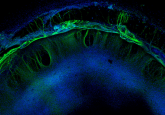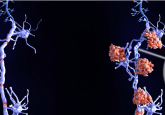NCTalks with Gavin Giovannoni: advancements in the treatment landscape for multiple sclerosis
Important information
The following feature is intended for healthcare professionals only. Please tick the box below to confirm that you are a healthcare professional.
In this podcast, we spoke with Gavin Giovannoni (Barts and the London School of Medicine and Dentistry, London, UK) to discuss recent advances in the treatment landscape for multiple sclerosis (MS). Gavin speaks about the biggest challenges surrounding the development of therapies for MS, including what advancements have been made in disease-modifying therapies.
Questions include:
00:36 – Please could you introduce yourself and tell us more about your role?
01:18 – What inspired you to work in the field of MS?
02:31 – In your opinion, what are the biggest challenges surrounding the development of therapies for MS?
05:41 – What advancements have been made in disease-modifying therapies for MS?
08:30 – What is unique about MAVENCLAD®? What are the benefits of this treatment and why should neurologists choose it?
12:53 – What is the need for MAVENCLAD® and which patients benefit most from it?
13:27 – Now that MAVENCLAD® is launched and available in more than 70 countries across the world, including both Europe and the US, can you elaborate a little bit on the real-world experience we are seeing with MAVENCLAD®?
16:08 – Looking to the future, what advances are you most excited to see from the field?
GBPMLR/CLA/0320/0027 – Prepared 8 April 2020
Merck KGaA has facilitated the recording of this podcast as part of the Merck-sponsored ‘Multiple sclerosis In Focus’ on Neuro-Central.com. These are the opinions and statements of the author and doesn’t necessarily reflect the view of Merck KGaA. The content in this podcast is intended for healthcare professionals only.
View the full 'In Focus' feature here
PRESCRIBING INFORMATION – UK AND IRELAND
MAVENCLAD® cladribine (please refer to the full Summary of Product Characteristics before prescribing)
PRESENTATION: Cartons of one, four or six tablets. Each tablet contains 10 mg of cladribine.
INDICATIONS: Treatment of adults with highly active relapsing multiple sclerosis (MS) as defined by clinical or imaging features.
DOSAGE AND ADMINISTRATION: Must be initiated and supervised by a physician experienced in MS treatment. Recommended cumulative dose: 3.5 mg/kg body weight over 2 years, administered as one treatment course of 1.75 mg/kg per year. Each course comprises 2 treatment weeks, one at the start of the first month and one at the start of the second month of each year. Each treatment week comprises 4 or 5 days on which the patient receives 10 mg or 20 mg as a single daily dose, depending on body weight. For details, see dosage tables in the SPC. No further cladribine treatment is required in years 3 and 4.
CONTRAINDICATIONS: Hypersensitivity to cladribine or to the excipients; HIV infection; active chronic infection (tuberculosis or hepatitis); initiation in immunocompromised patients including those receiving immunosuppressive or myelosuppressive therapy; active malignancy; moderate or severe renal impairment (creatinine clearance <60 ml/min); pregnancy and breastfeeding.
PRECAUTIONS: Not recommended in moderate or severe hepatic impairment. Exercise caution in elderly patients. Determine lymphocyte counts before initiation in years 1 and 2, 2 and 6 months after treatment start in each treatment year. Count should be normal pretreatment in year 1. If count below 500 cells/mm3 at 2 or 6 months, actively monitor until values increase. If count below 800 cells/mm3 pretreatment in year 2, delay treatment. Stop treatment if recovery takes more than 6 months. Screen for latent infections prior to initiation in years 1 and 2. Delay initiation in latent or acute infection until treated.
Varicella zoster vaccination is recommended in antibody-negative patients prior to treatment initiation. Delay initiation for 4–6 weeks following vaccination. Consider anti-herpes prophylaxis during grade 4 lymphopenia. If lymphocyte count falls below 500 cells/mm3, actively monitor for symptoms suggestive of infection and initiate anti-infective treatment accordingly. Interrupt or delay MAVENCLAD until infection has resolved. Perform baseline MRI before initiating MAVENCLAD (usually within 3 months). Evaluate benefit–risk prior to initiation in patients with previous malignancy. Advise patients to follow standard cancer screening guidelines. Exclude pregnancy before initiation in years 1 and 2.
Before initiation in year 1 and 2, counsel male and female patients on potential for risk to the fetus and need for effective contraception. Contraception should be used by both male and female patients during treatment and for at least 6 months after the last dose. Women using systemically acting hormonal contraception should add barrier method during treatment and for at least 4 weeks after last dose in each treatment year.
In patients previously treated with immunomodulatory or immunosuppressive products, consider their mode of action and duration of effect before initiation of MAVENCLAD. Consider an additive effect on the immune system when such products are used after treatment with MAVENCLAD. When switching from another MS agent, perform a baseline MRI. In patients requiring blood transfusion, irradiation of cellular blood components is recommended prior to administration. Separate administration of any other oral medicinal product by at least 3 hours from MAVENCLAD administration.
Concomitant treatment with other disease-modifying treatments for MS not recommended. Monitor hematological parameters when taken with other substances that affect the hematological profile. Do not initiate treatment within 4–6 weeks of live or attenuated live vaccines. Avoid vaccines during and after treatment while white blood cells not within normal limits. Avoid co-administration of ENT1, CNT3 or BCRP inhibitors during the 4- to 5-day treatment period. Consider possible decrease in cladribine exposure if potent BCRP or P-gp transporter inducers are co-administered.
SIDE EFFECTS:
Very common: lymphopenia; Common: oral herpes, dermatomal herpes zoster, decreased neutrophils, rash, alopecia; Other side effects: tuberculosis. In clinical studies and long-term follow-up, malignancies were observed more frequently in cladribine-treated patients compared to placebo.
Prescribers should consult the Summary of Product Characteristics in relation to other side effects.
LEGAL CATEGORY: POM.
PRICE:
Pack of one tablet: £2,047.24
Pack of four tablets: £8,188.97
Pack of six tablets: £12,283.46
For prices in Ireland, consult distributor Allphar Services Ltd.
Marketing authorization holder and numbers:
Merck Europe B.V., Gustav Mahlerplein 102,1082 MA Amsterdam, The Netherlands;
EU/1/17/1212/001, 002 & 004
For further information contact:
UK: Merck Serono Ltd, 5 New Square, Bedfont Lakes Business Park, Feltham, Middlesex, TW14 8HA. Tel: 020 8818 7373.
Republic of Ireland: Merck Serono (Ireland) Limited, 4045 Kingswood Road, Citywest Business Campus, Dublin 24. Tel: 01 4687590.
Date of Preparation: January 2020 Job No: UK&IE/CLA/0818/0089(2)
Adverse events should be reported. Reporting forms and information can be found at www.mhra.gov.uk/yellowcard. In the Republic of Ireland information can be found at www.hpra.ie. Adverse events should also be reported to Merck Serono Limited – Tel: +44(0)20 8818 7373 or email: [email protected].
Click here for the full 'In Focus' feature
Disclaimer
The opinions expressed in this interview are those of the interviewee and do not necessarily reflect the views of Neuro Central or Future Science Group.






